Acer Predator Orion 7000 (2022) Review
Can this big-brand, water-cooled gaming PC impress?

Verdict
The Acer Predator Orion 7000 is a bold, sturdy and good-looking gaming PC – and it offers reasonable speed. But your money will go further elsewhere, and if you shop around you’ll find better specifications with more pace and versatility.
Pros
- Fast in games and applications
- Quieter than most gaming PCs
- Good-looking, robust design
- Plenty of ports, especially on top of the case
Cons
- Similarly-priced PCs are far faster
- Processor doesn’t reach its full potential
- Underwhelming motherboard
- Tricky internal access
Availability
- UKRRP: £2499
- USARRP: $2649
- EuropeRRP: €3498
Key Features
- Nvidia GeForce RTX 3080The Nvidia GeForce RTX 3080 may be a bit long in the tooth now, but it’s still a very capable GPU that’ll handle mainstream games, most titles at 4K and any fast-paced esports title – and widescreen displays and VR headsets are within reach, too.
- Intel Core i9-12900KThis high-end Intel CPU has eight Hyper-Threaded performance cores and lofty clock speeds, so it’s got the grunt to tackle photo-editing, video work and streaming. It won’t cause any gaming bottlenecks, either.
- A bright, bold and robust enclosureAcer’s chassis looks good thanks to sleek angles and loads of customizable RGB LED lighting, and it’s extremely sturdy. It also has plenty of top-mounted ports and even includes a hot-swappable drive bay for easy portable storage.
Introduction
Gaming PCs are often the most outrageous and expensive systems on sale at any retailer, and the Acer Predator Orion 7000 stays true to type with a bold design and loads of powerful components.
Graphical grunt in this rig comes from an Nvidia GeForce RTX 3080, and Intel Core i7 and Core i9 processors bolster the high-end GPU.
The model I’ve reviewed pairs the RTX 3080 with a Core i9 processor and costs £2499 in the UK and €3499 in Europe. In the US, that graphics card sits alongside a Core i7 processor and costs $2649.
No matter the internals, it’s a hefty sum to pay for a gaming PC – so it’s time to find out if the Acer Predator Orion 7000 is worth the price.
Design
- A good-looking, bold and robust chassis with plenty of RGB LEDs
- A decent selection of ports, especially on top of the tall case
- The internals are tricky to reach, and you’ll get more versatility elsewhere
There’s no denying that the Acer Predator Orion 7000 looks the part. The internals are visible through a tempered glass panel, the front panel glows thanks to two RGB LED intake fans, and you’ll find more coloured lighting on the processor’s water-cooling unit, on the chassis exhaust fan, and on the motherboard.
This imposing rig pairs the customizable lights with solid lines and sharp corners, and it will attract envious eyes. It’s robust, too, so it’ll withstand LAN party trips.
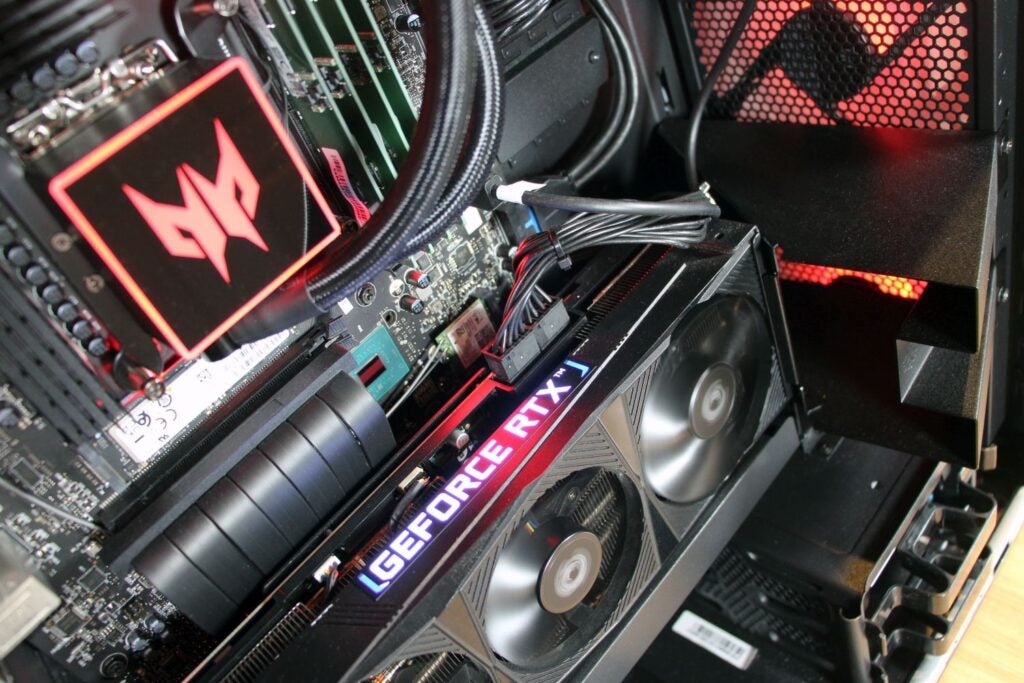
The PC isn’t just about looks, either. On top of the enclosure you’ll find three USB 3.2 ports and a Type-C connection, which is a decent selection. Behind the ports you’ll find a hot-swappable 2.5in drive bay with its own USB-C connection – perfect for creating a portable drive to share files across systems.
Around the back, the Acer Predator Orion 7000 serves up three USB 3.2 Gen 2 ports, two USB 2.0 sockets and a USB-C port. Graphics output comes from three DisplayPort sockets and an HDMI 2.1 port. The only disappointment is the inclusion of three audio jacks – many gaming PCs have five alongside an S/PDIF connector.
Acer’s technicians have done a good job of keeping the internals tidy, and there are some welcome practical touches too. The 120mm water-cooling unit doesn’t impede the memory slots, and a spare 3.5in drive bay allows tool-free storage expansion. A plastic funnel directs air towards the vertical GPU to improve cooling, and around the back there’s room for two 2.5in drives.
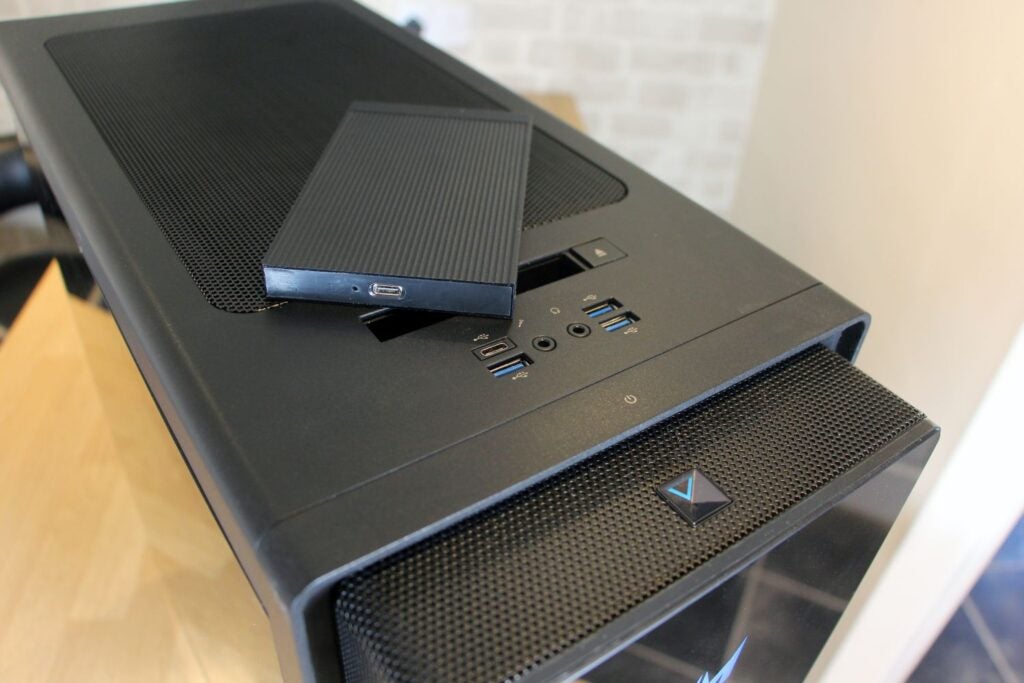
In some ways, though, the Acer falls behind PCs you’ll get from smaller manufacturers. Acer’s motherboard only supports PCI-E 3.0, but you’ll find PCI-E 4.0 and 5.0 support elsewhere, and other boards at this level usually have better USB connectivity and more than two M.2 connectors.
It’s tricky to access the Acer’s internals, too. You’ll need a screwdriver to remove the side and front panels, and the top dust filter isn’t magnetic. The vertical GPU also means other PCI slots are tricky to reach.
You don’t have to spend much extra cash to solve these issues. Boutique builders in the US and UK sell PCs with better motherboards and more accessible enclosures at similar prices to the Acer. All these manufacturers offer customizable specifications, too.
You’ll also get better warranties with the vast majority of those rigs. A one-year warranty protects the Acer, but most local builders offer three- or five-year deals as standard.
Performance
- Solid gaming and processing pace
- Neither component impresses in the wider marketplace
- Shop around and you’ll find faster PCs for hardly any extra cash
The Acer’s RTX 3080 may be the 10GB version rather than the slightly quicker 12GB unit, but it still has 8,704 CUDA cores and the Ampere architecture. Intel’s Core i9-12900K has eight Hyper-Threaded performance cores, and Acer pairs a 1TB Samsung SSD with a 2TB secondary drive.
Dual-band Wi-Fi 6E and Bluetooth 5.2 means rapid wireless connectivity, and there’s an 80Plus Gold-certified power supply. The rig only has Gigabit Ethernet when faster 2.5Gbps connections are now commonplace, though, and the 4000MHz DDR5 is slow compared to the 4800MHz RAM you’ll often find elsewhere.
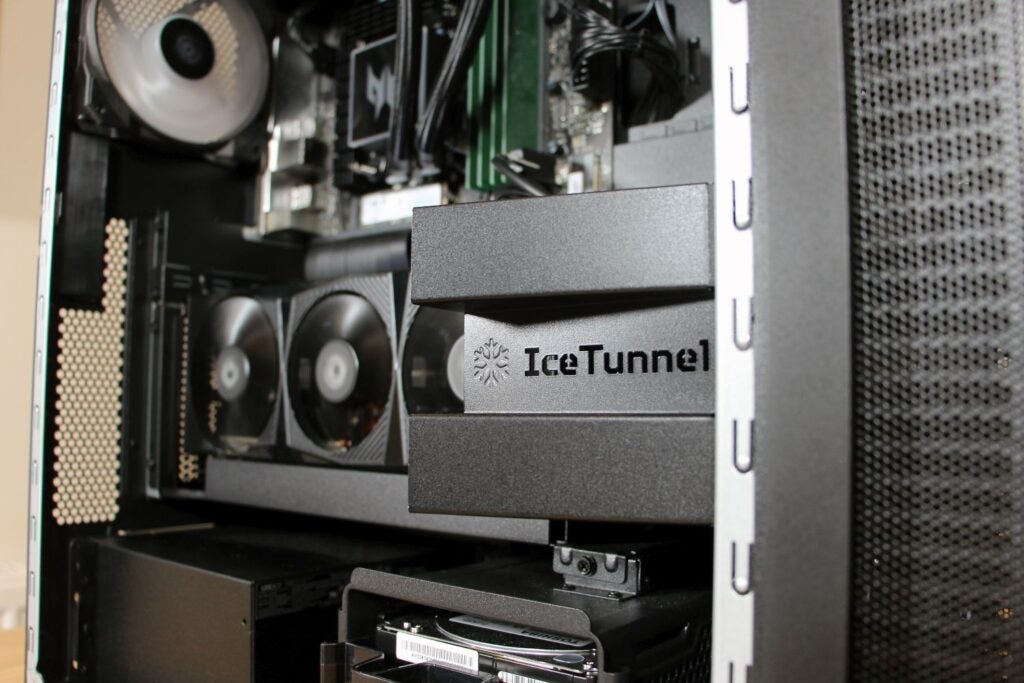
The RTX 3080 will tackle most gaming situations. Horizon Zero Dawn is a challenging single-player title but at Ultimate graphics settings the Acer rattled through a 4K test at 83fps, and it averaged 64fps in Borderlands 3.
You’ll be able to play most games smoothly at 4K, on VR headsets and on widescreens with this PC – only the most demanding games will make you drop down the graphics settings. It’ll handle most ray-traced games, too.
In the eSports-friendly Rainbow Six Siege the Acer scored 480fps in a 1080p test and 265fps at 4K, so you’ve got enough clout here to play competitive games on 480Hz displays and other high-resolution screens.
Acer’s PredatorSense app has overclocking modes for the GPU, too, but don’t expect much – I tested them in Borderlands and Rainbow Six and their fram erates actually dropped slightly.
There’s plenty of power from the Core i9-12900K processor, too, but it doesn’t reach its full potential in the Acer Predator Orion 7000. In the Geekbench 5 benchmark, for instance, the Acer scored 1,670 and 15,956 – but in the processor’s review it scored 1,899 and 16,810. It’s a similar story in PC Mark 10: the Acer scored 8,829 but our review sample topped out at 9,966.
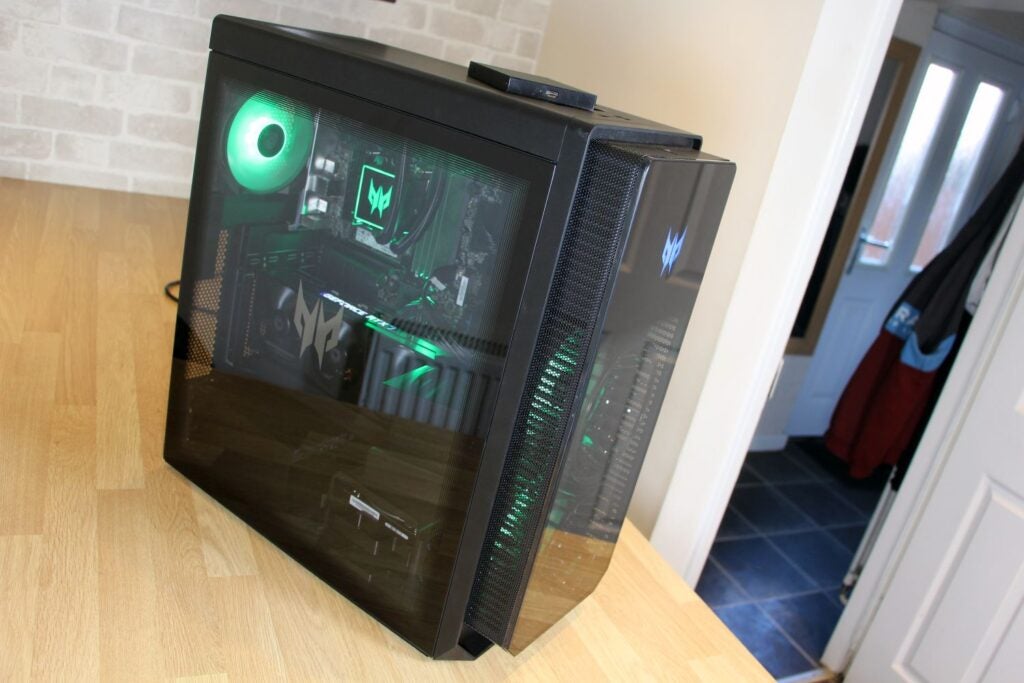
A thermal examination reveals the truth. In a single-core stress-test the processor’s P-cores peaked at 5GHz, which is good, but in a multi-core benchmark the chip hit 100-degree temperatures before throttling to 3.6GHz. That’s underwhelming and means the CPU can’t achieve its full potential.
You won’t get any extra grunt from the rig’s Faster and Turbo modes, either. Just like in gaming tests, the Acer’s processing performance actually declined with those options activated.
It’s not all bad news. The processor throttling means that the Acer Predator Orion 7000 is quiet when pelting through tough workloads, and it doesn’t make much noise during gameplay – this is an easy PC to live with. And while the CPU doesn’t reach its full potential, it’s easily good enough for mainstream photo- and video-editing, and it’ll handle multi-tasking and streaming easily.
In isolation, then, the Acer is fast but still falters. Sadly, the situation is no better when you cast your net around the wider market.
The RTX 3080 has been superseded by Nvidia’s GeForce RTX 4080, and at CyberPower you’ll get a PC with that GPU for around $3,000 or £3,000 – or even less, especially if you’re willing to compromise on processing power. Those prices are typical elsewhere in the market, too.
You might spend a little more on an RTX 4080 PC, but the performance difference is worth the extra outlay: the Acer’s RTX 3080 scored 16,815 in 3DMark Time Spy, while the RTX 4080 typically hits around 23,000 points. I also wouldn’t be surprised if the RTX 4070 Ti outpaced the RTX 3080, too, so that’s a compelling option for early 2023.
The processor suffers similarly. The i9-12900K is quick, but the i9-13900K scores 2,000 and 23,000 in Geekbench. The i7-13700K also sneaks ahead of the Core i9 chip. When most locally-built gaming PCs now include 13th Gen CPUs instead of 12th Gen hardware, it’s an easy upgrade.
A closer look at pricing reveals how far your money could go. In the US, for $2649, the Acer comes with a Core i7 CPU and the RTX 3080. At CyberPower, Origin and iBUYPOWER, you can configure an i7-13700K/RTX 4080 PC for $2903, $3351 or $3148. Those PCs all come with longer warranties and more versatility when it comes to picking cases, motherboards and other parts.
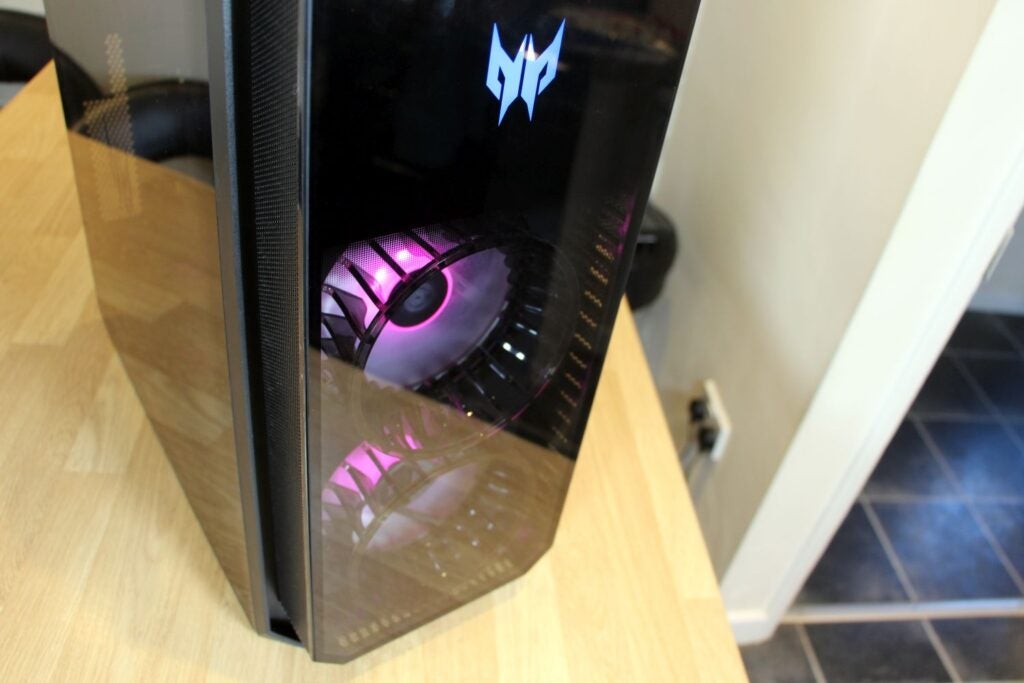
It’s the same in the UK. The Acer’s i9-12900K/RTX 3080 configuration costs £2499, but you can get an i7-13700K/RTX 4080 PC from CyberPower, Scan and Wired2Fire for £2999, £2899 and £3034. The price may be a bit higher but, again, you get more for your money.
It leaves the Acer Predator Orion 7000 in a tricky spot. In isolation, this PC is fast – it’ll handle almost every mainstream game and creative workload. It looks superb, it’s robust, and it’s consistently quiet.
The world has moved on, though, and you’ll see exactly how far things have progressed if you look elsewhere. Shop around and you’ll easily find faster components, better motherboards, more versatile designs and lengthier warranties, and the prices aren’t often much higher than what you’ll pay for the Predator.
The Acer Predator Orion 7000 is undoubtedly the best big-brand gaming PC you can buy today, but it’s hard to recommend unless you’re committed to buying from a high-street name. If not, your cash will go much further elsewhere.
Latest deals
Should you buy it?
You’d like solid performance and eye-catching design from a big name
The RTX 3080 and Core i9-12900K will handle almost every mainstream gaming and productivity scenario, and Acer’s system is robust and good-looking – it holds its own when it comes to visual design.
You want maximum speed and versatility from your next gaming rig
Shop around and you’ll easily find faster PCs that don’t cost much more than this – and you’ll be able to customise their specifications and benefit from better warranties, too.
Final Thoughts
The Acer Predator Orion 7000 has reasonable pace, good-looking design, a sturdy chassis and quiet operation, but your money will go much further if you shop around – you’ll easily find more pace, versatility and protection.
How we test
Every gaming PC we review goes through a series of uniform checks designed to gauge key aspects including build quality, performance, and accessibility.
These include formal synthetic benchmarks and scripted tests, plus a series of real-world checks, such as how well it runs an AAA game.
We used it as our main laptop for at least a week.
We tested the performance via both benchmark tests and real-world use.
FAQs
Acer is the company that assembles the Predator Orion series, although it picks components from other companies since Acer doesn’t create its own CPUs, GPUs or SSDs etc.
It will vary in price depending on the specs, but our review model is priced at £2499 in the UK, $2649 in the US and €3499 in Europe.


